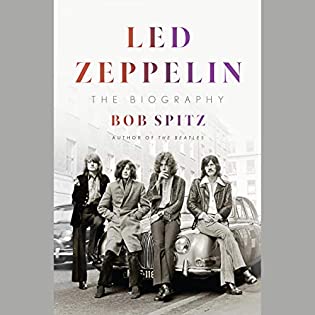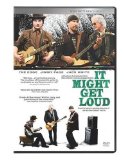 Led Zeppelin: The Biography by Bob Spitz
Led Zeppelin: The Biography by Bob Spitz Narrator: Rob Shapiro
Published by Penguin Audio on November 9, 2021
Genres: Biography, Nonfiction
Length: 21 hours 35 minutes
Format: Audio, Audiobook
Source: Audible
Buy on Amazon, Buy on Bookshop
This post contains affiliate links you can use to purchase the book. If you buy the book using that link, I will receive a small commission from the sale.
Goodreads
From the author of the definitive New York Times bestselling history of the Beatles comes the authoritative account of the group Jack Black and many others call the greatest rock band of all time, arguably the most successful, and certainly one of the most notorious. Rock stars. Whatever those words mean to you, chances are, they owe a debt to Led Zeppelin. No one before or since has lived the dream quite like Jimmy Page, Robert Plant, John Paul Jones, and John Bonham. In Led Zeppelin, Bob Spitz takes their full measure, for good and sometimes for ill, separating the myth from the reality with the connoisseurship and storytelling flair that are his trademarks.
From the opening notes of their first album, the band announced itself as something different, a collision of grand artistic ambition and brute primal force, of delicate English folk music and hard-driving African-American blues. That record sold over 10 million copies, and it was the merest beginning; Led Zeppelin's albums have sold over 300 million certified copies worldwide, and the dust has never settled. Taken together, Led Zeppelin's discography has spent an almost incomprehensible ten-plus years on the album charts. The band is notoriously guarded, and previous books shine more heat than light. But Bob Spitz's authority is undeniable and irresistible. His feel for the atmosphere, the context—the music, the business, the recording studios, the touring life, the radio stations, the fans, the whole ecosystem of popular music—is unparalleled. His account of the melding of Page and Jones, the virtuosic London sophisticates, with Plant and Bonham, the wild men from the Midlands, into a band out of the ashes of the Yardbirds, in a scene dominated by the Beatles and the Stones but changing fast, is in itself a revelation.
Spitz takes the music seriously, and brings the band's artistic journey to full and vivid life. The music is only part of the legend, however: Led Zeppelin is also the story of how the 60's became the 70's, of how playing in clubs became playing in stadiums and flying your own jet, of how innocence became decadence. Led Zeppelin may not have invented the groupie, and they weren't the first rock band to let loose on the road, but they took it to an entirely new level, as with everything else. Not all the legends are true, but in Bob Spitz's careful accounting, what is true is astonishing, and sometimes disturbing. Led Zeppelin gave no quarter, and neither has Bob Spitz. Led Zeppelin is the full and honest reckoning the band has long awaited, and richly deserves.
Oof. Okay, this book. I will start with the caveat that when I was in high school, Led Zeppelin was my favorite band. This was post-breakup, several years beyond John Bonham’s death, when Robert Plant had a flourishing solo career. I was 15, I think, when I first heard them on the radio, and I started buying up cassette tapes of their back catalog. I listened to them so much that when I put on one of their albums today, I still know them note-for-note. Over the years, I admit my interest waned, and I did not seek out many of the posthumous releases that have come out over the last 20 years or so. I don’t even own all of their albums in iTunes (something my 17-year-old self probably would have thought unthinkable). I haven’t read some of the books and memoirs, but I had read enough of them to know they’re generally hagiographic and fawning in nature. I had heard good things about this biography, so I decided to listen to the audio version.
This is a great biography. Spitz wasn’t able to interview the band, who (probably wisely) opted not to talk with him in the wake of #MeToo. However, he did interview many people I’d never heard from before. As a result, I learned many things about the band that I didn’t previously know, especially about Jimmy Page’s childhood, adolescence, and early music career. Even as a big fan of their music, I wasn’t aware of the extent to which the group was really Jimmy’s band with some hired musicians (essentially), or that they really weren’t friends with each other, or that their drug problems were that bad. On a surface level, I knew some of these things, but Spitz helped me understand these things and how they impacted the band. I had a pretty thorough knowledge of some of the groupie stories, but they were disturbing in the extreme in Spitz’s telling. I think other books tend to gloss over the stories or cast them in a different light, but Spitz shines a great big spotlight on them. These men did not believe women were fully-fledged human beings worthy of any sort of respect. That’s it. Led Zeppelin definitely suffers under the microscope. In particular, their manager Peter Grant, tour manager Richard Cole, and drummer John Bonham were thugs and should probably have done prison time—all three of them—for the violence they committed. Multiple assaults, rape, arguably attempted murder. The only shocking aspect of John Bonham’s death is that it didn’t happen sooner. In fact, it’s pretty shocking Jimmy Page didn’t die, too. I didn’t realize how close the band was to breaking up anyway when John Bonham died, either.
Spitz’s background in music is also handy when he’s describing their performances and recorded output. He takes a fresh look at their music, as he was not a fan prior to writing the book, and as such, he avoids some of the fanboy flattery that so many other books and articles engage in when discussing Led Zeppelin. In his hands, the music feels fresh and new. I consider it remarkable restraint that he didn’t excoriate “Hot Dog,” arguably the worst song they recorded. He mentioned the song just once. The last two albums were definitely a letdown after Physical Graffiti, which is probably my favorite of their albums. I caution Led Zeppelin fans about reading this one. Spitz is unflinching, and he may take them down a few notches in your estimation (he certainly did in mine). It’s hard to look away from the worst of their excesses with your respect for the band intact. Still, I thought it was a fascinating examination of the group’s stories and music.


